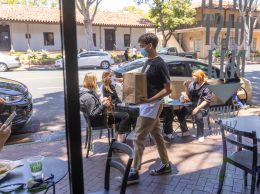California Gov. Gavin Newsom announced a revised stay-at-home order on Dec. 3 that is tied to each region of the state’s intensive care capacity.
In areas where the ICU capacity falls below 15%, a stay-at-home order will be implemented for three weeks. Under this new order, the state is broken into five regions, with Ventura, Santa Barbara and San Luis Obispo counties all in the Southern California region.
During his Dec. 3 news conference, Newsom said Southern California is expected to drop below 15% ICU capacity within the next week and a half.
“If we don’t act now, our hospital system will be overwhelmed,” Newsom said.
Once a region reaches the 15% threshold, several industries that have been allowed to reopen under previous restrictions will have to close again. Bars, wineries, personal service providers, hair salons and barbershops will all have to close.
Not everything will re-close. During the address, Newsom said schools that have already received a waiver will stay open as will critical infrastructure, retail and restaurants. Retail will be limited to a 20% capacity, and restaurants will be limited to take-out and delivery.
That means that even outdoor dining, which many restaurants have relied on to help bolster their revenue during the pandemic, will be forced to shut down.
At the same time as he was announcing these new restrictions, Newsom urged people to remember that vaccines are on the way, and that these restrictions are meant to be temporary.
“This is not a permanent state,” Newsom said. “There is light at the end of the tunnel.”
The first vaccines are expected to be available later in December, and the state has announced a tiered system to get the vaccines first to the people who need them most, including health care workers and nursing home residents.






 Print
Print Email
Email

















